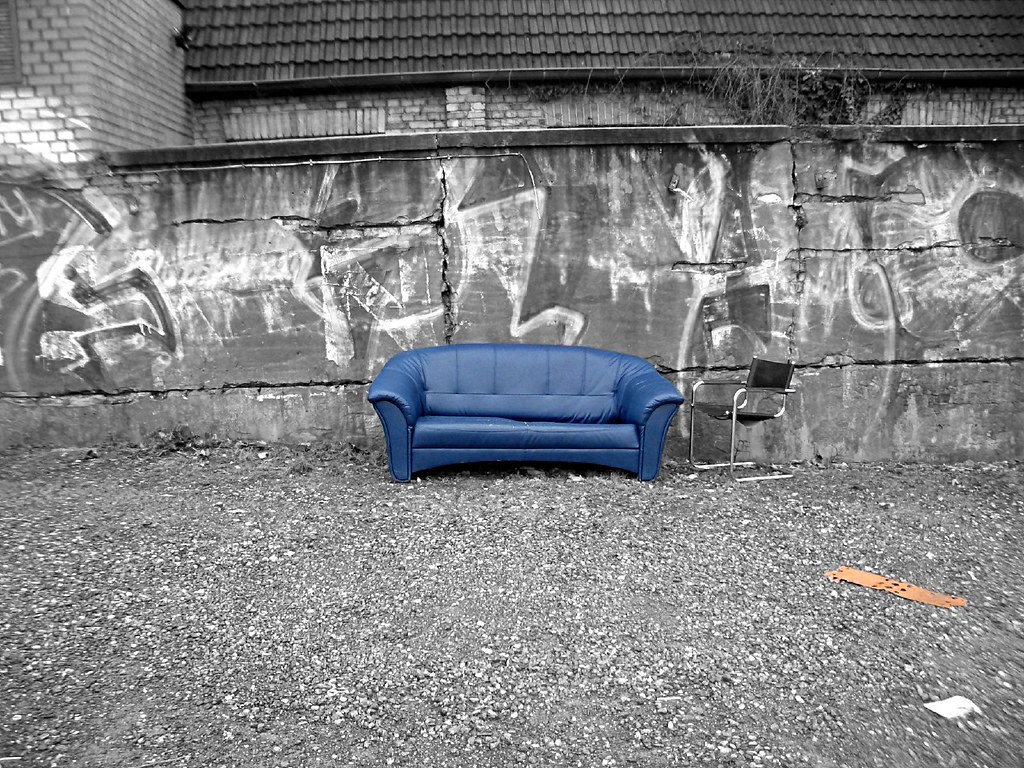“Eddies,” said Ford, “in the space-time continuum.” “Ah,” nodded Arthur, “is he? Is he?”
“What?” said Ford. “Er, who,” said Arthur, “is Eddy, then, exactly, then?”
…
Why,” he said, “is there a sofa in that field?”
“I told you!” shouted Ford, leaping to his feet. “Eddies in the space-time continuum!”
“And this is his sofa, is it?” asked Arthur, struggling to his feet and, he hoped, though not very optimistically, to his senses.
Jump onto Eddy’s sofa for a moment and fast forward to a possible 2015.
With this thorny problem solved, location issues became a thing of the past, no one used the phrase ubiquitous location any more and location really was a key context.
Of course, the fact that the GPR was now the sole global source of places doesn’t mean that it’s complete or authoritative. Being controlled by a single corporation, the GPR is an easy and obvious target for hacking and litigation. A dedicated team spends all their time removing places and POIs from the register that have offensive or religious connotations, either as a result of user generated contributions or malicious hacking.
Sadly, the cities of London in Ontario and Ohio are no longer found in the GPR; they’ve had to rename themselves after a successful trademark and copyright case brought by London in the United Kingdom, which is now the sole place in the world allowed to call itself by that name. This does make geodisambiguation a bit easier though.
Likewise, you won’t find any newsagent or newsstand POIs in the GPR; they were all removed following a successful DMCA takedown by the League of Concerned Conservative Fundamentalist Parents, who didn’t want their precious offspring to be able to locate purveyors of potentially offensive adult material on their GPR powered LBS apps on their Android mobile internet tablets.
The same goes for any business with the word jolly in it; they were all removed and forced to rebrand following the success of Jolly Jet trademarking the word jolly and then pursuing an aggressive litigation program against any business unfortunate enough to have that word as part of their name.
This is all just a geographical bad dream. It’s not real. Wake up. Back to 2010 now, safe and secure in the knowledge that this could never happen …
Yet there is a growing clarion call for an open global database of places, POIs and business listings that will allow all of the disparate geographic identifier systems to be rationalised and used interchangeably. It’s the problem of what I’ve started calling GeoBabel but an actual global database of places isn’t the solution to this problem.
Tyler Bell recently commented in an O’Reilly Radar post that an actual (open) database of places is the preferred (long to mid term) outcome. But experience has taught users of geographic data sets that there is no one single authoritative data source for their needs, except in the most facile of use cases. Most users instead aggregate data sets, using them to obtain at least partial coverage for their needs; this despite it being forbidden in most commercial data vendor’s licenses. In a similar vein, existing users will already have made a commitment, both financial and technical to tagging and using geographical references of a certain sort, be it long/lat or a place based id.
For this reason alone, the most likely outcome will be what Tyler calls an “open and accessible Local Listings Crosswalk, essentially an API that take your URI and translates it to my URI so we can ensure we’re speaking about the same (place or business)“. While this is Tyler’s bet for a short term solution, if built, this will allow the data set creators to focus on what they do best, creating the data for their market segment or niche, without the inevitable intellectual property concerns that contributing data to such a project would raise.
Despite the success of OpenStreetMap, solely crowdsourcing the URI and id data is probably not the answer, though OSM would be a not unreasonable starting point for such a venture. Instead we need something that fulfils the role of this crosswalk, translating URIs and identifiers in a common, open manner.
Let’s call it the Geosetta project, the Geographical Rosetta Stone …
There can be no single owner; there can be and should be a shared set of contributors, from the crowd, from the corporate world and all points in between. But let’s not get bogged down in a long winded debate over data formats, endpoint URIs or the relative merits of JSON vs. REST.


Nothing is ever easy when it comes to Google